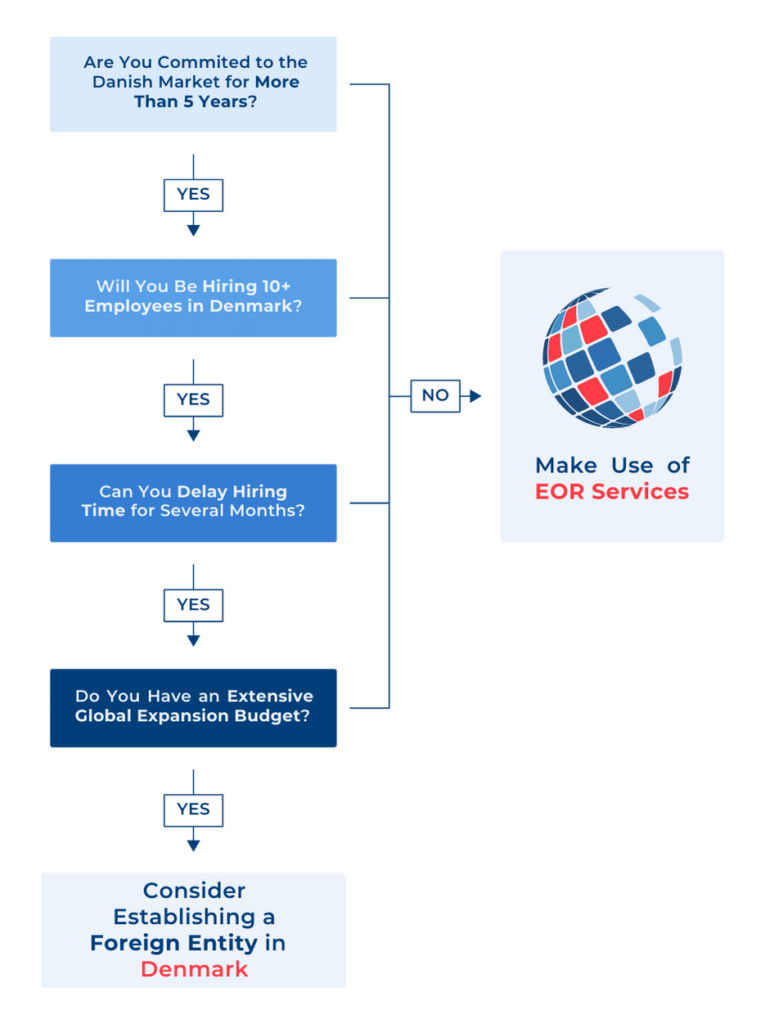デンマークの習熟作業者派遣組織
グローバルに雇用、現地で支払い、容易に拡張
INS グローバルは、世界中の人材サービスのトップ ローカル パートナーです。 当社のグローバル習熟作業者派遣組織を使い、ビジネスを立ち上げ、有能な労働者を雇い、80か国以上で成功を収めることができます。同時に、グローバル展開に通常伴う面倒な手続きや追加費用を削減できます。
習熟作業者派遣組織は、別の法的事業体を作ることなく、人事サービスをアウトソーシングしたり、新しい地域や国に拡大したりする企業のお手伝いをするローカル パートナーです。
習熟作業者派遣組織を使用すると、スタッフの雇用や、採用、給与、福利厚生、報酬などの他の従業員サービスの管理を支援できます。これらのグローバル HR アウトソーシング サービスにより、複雑な現地の規制手続きを回避し、時間とお金を節約できます。
デンマークの習熟作業者派遣組織 - Summary
デンマークの習熟作業者派遣組織
習熟作業者派遣組織の使用: 5 つの主な利点
法令順守
現地の法的・行政手続きに関する深い知識を活用して、習熟作業者派遣組織は御社がスマートに、且つ効率的に現地の法律を遵守することを確約します。
コストと時間を削減
新規市場に参入する際、遭遇する一般的な問題の 1 つは、人事に関する小さな問題でさえ、驚くほど高額な手数料や罰金につながる可能性があるということです。 習熟作業者派遣組織 は、これらのコストのかかる失敗を回避するのに役立ちます
会社の成長を加速させる
給与計算アウトソーシング、採用、ヘッドハンティング、請負業者管理サービスなど、多くの骨の折れるタスクをカバーすることで、習熟作業者派遣組織は、市場の成長を成功させ、時間とエネルギーをあなたに集中させることができます。
迅速な市場参入
新規市場での会社設立の推定時間: 4 ~ 12 か月
習熟作業者派遣組織との関係を確立するための推定所要時間: 5 日
*グローバル見積もり
すべてのニーズに対応する 1 つのプラットフォーム
習熟作業者派遣組織は、人事サービスのあらゆる面をカバーし、それらを単一の窓口に合理化して、一度に複数のスタッフや部門を管理する必要がないようにします。
会社設立よりも習熟作業者派遣組織を選ぶ理由
海外市場への参入はターゲットとなる国の法的、及び物理的存在感の両方を示す必要があるため複雑で、難解なプロセスとなる場合があります。 しかし、習熟作業者派遣組織と連携すれば、そのような事業体を作るために苦労することなく、新規市場で効率的に事業を行うことができます。
習熟作業者派遣組織
- 処理時間を短縮
コストを削減
潜在的な法的落とし穴を回避
現地のネットワークと専門知識を活用


証言
マヌエル・ラモス
テラオ アジア
取締役社長
INS グローバルは、新しく複雑なマーケットでビジネスを開始するための優れたソリューションであると考えています。 マーケットを理解したからといって、すぐに会社を設立する必要があるわけではありません。
デンマークの習熟作業者派遣組織はどのように機能しますか?
4 つの簡単な手順で、INSグローバルの習熟作業者派遣組織はデンマークでの従業員の採用と人事のニーズに対応します。
お客様の状況やご要望をお伺いし、最適なプランを一緒に考えます。
私たちの組織は、デンマークで事業を開始するために従業員を雇用するための事業体を提供します。
私たちは、従業員の雇用と支払いに関するすべての管理上および法務上の面を管理します。
従業員は日常業務を継続して行い、人事の詳細をすべてカバーしながら、デンマーク市場での成功への近道を御社に導きます。
習熟作業者派遣組織と雇用代行業者 の違いについて
新規市場への進出を決定し、習熟作業者派遣組織との契約を開始したい場合、ニーズに最も適したサービスを選択できるように、習熟作業者派遣組織と雇用代行業者の違いを理解することが重要です。
習熟作業者派遣組織 は、他社の従業員に人事サービスを提供する会社です。 これらのサービスには、給与計算、税金、法規制の遵守などが含まれる場合があります。
雇用代行業者 は 習熟作業者派遣組織 と同様に機能する会社ですが、他の会社に代わって合法的かつ公式に従業員を雇用することもできます。
習熟作業者派遣組織が提供するサービスに加えて、雇用代行業者 は、労働者の募集と雇用に関するすべての責任も負います。
習熟作業者派遣組織の契約では、元の会社と従業員の間で契約が結ばれます
雇用代行業者の契約は、元の会社によって指示されますが、雇用代行業者 と従業員の間で行われます。
デンマークの労働法
デンマークでの契約はデンマーク語で書かれ、通貨はデンマーク クローネとなります。 従業員の責任と福利厚生に関するすべての詳細を含めることになります。 契約は、従業員が勤務を開始する 1 か月前に完了する必要があります。 これに遵守しない場合、雇用主は従業員に最大 10,000 クローネの補償を支払う可能性が出てきます。
従業員の権利と福利厚生に関する多くの詳細は、団体交渉協定 (CBA) によって決定されます。 CBAは、残業代や休暇日数などの重要な件を決定するため、それらと関連する業界によって確立された既存の基準を十分に理解する必要があります.
デンマークの労働時間と残業
デンマークの平均労働時間は 37.5 時間で、残業を含めて最大 48 時間です。 従業員は週に少なくとも 1 日 (通常は日曜日) の休日を取得する権利があります。
従業員は、別段の交渉がない限り、勤務シフトの間に 11 時間の休暇を取ることが求められています。
デンマークの祝日と年次休暇
デンマークの祝日は次のとおりです。1 月 1 日、洗足木曜日、聖金曜日、復活祭の月曜日、祈祷日、昇天祭、ペンテコステ、聖霊降臨祭の月曜日、クリスマス、ボクシング デー。
これらの日は、土日祝日にあたる場合を除き、国民の有給休暇として扱われます。
年間有給休暇日数は、1 か月勤務ごと 2.08 日間、または年間約 5 週間の休暇として計算されます。
デンマークの病気休暇
ノルウェーでは、雇用主が最初の30日間の病気休暇の給与とボーナスを含む全額支払います。それ以降の給与に関しては、起業会社に変わり行政が最大週額まで補償します。
デンマークの産休・育休
妊娠中の母親は、妊娠中は 4 週間、出産後は 14 週間休暇を取ることができ、給与の 少なくとも50%を受け取ることができます。 CBA に応じて、金額は給与補償の合計と同額になる場合があります。
父親は、子供の誕生後 2 週間の休暇を取得する権利があり、給与の 50% を受け取ります。 育児休暇の支払いは通常、個々の雇用主ではなく、政府によって発行されます。
デンマークの税法と社会貢献
デンマークの従業員は、総所得の 8% である社会保障税を含む、さまざまなサービスをカバーする複雑な税金システムを支払うことが求められています。
税金の合計額は最大 52.06% を超えてはなりませんが、教会税などの他の小さな税金はこの合計に含まれません。
雇用主は、従業員の社会保障拠出に貢献するために給与を差し控え、従業員自身の拠出に一定額を拠出することが求められています。 雇用主は、従業員 1 人あたり年間 DKK8000 ~ 10000 の拠出を求められることになります。
お問い合わせ
FAQs
一般的に、既存の PEO を記録上の従業員として使用して、従業員が海外に拠点を置くには 1 か月が必要です。 新しい子会社を正式な雇用主として設立する場合、遅延は 4 ~ 12 か月です。
Working with a Denmark EOR will allow you to transfer personnel legally, safely, and effectively, as well as hire new staff where you need them. Outsourcing is now acceptable for both short-term and long-term projects thanks to this strategy.
A worker who is co-employed by an EOR could have access to a range of services, such as enhanced employee benefits, all-encompassing legal protection, local knowledge of all employer needs, prompt and correct payment, and more.
Contractors that communicate with customers through an EOR or Danish PEO have access to many of the same benefits and protections as normal employees while having total control over their work process.
Yes, an EOR protects you wherever you go while accounting for any changes to local or regional labor laws.
There may be a minimum or maximum number of employees you may recruit with some PEO companies. However, you can use INS Global’s expansion services to hire and outsource the HR of however many people your expansion plans call for.
Payroll expenses must also include any additional or indirect costs like social insurance contributions, bonuses, or incentives, in addition to wages and any payments made to recruiting firms or specialists.
Even though signing bonuses are optional, they must be taken into account when estimating the price of conducting a global hiring operation.
To provide the most competitive package to possible candidates, employees of a firm with a presence in Denmark should have the choice of selecting between a physical workplace and a home office.
With access to professional networks, in-depth knowledge of both offline and online business resources, proficiency in adhering to regional best practices, and more, our recruiting professionals can help you locate the best new team members in Denmark.
In order to assist you in finding the finest applicants among Danish citizens and international residents, INS Global employs the most recent hiring technologies and sector-specific information. To avoid any problems, we take into account any changes in local customs and laws pertaining to nationality when we employ on your behalf.
For companies of all sizes, from SMEs to global corporations, using an EOR is a quick, simple, and safe alternative to in-house HR and recruitment.
INS Global provides crucial PEO or global Employer of Record services to businesses in a range of sectors, with our legal knowledge being suitable for anybody who either lacks their own internal structures in-country or wishes to avoid scaling issues when expanding.
A staffing agency or an umbrella company are examples of third parties that may be used to engage independent contractors either directly or indirectly. You might be able to identify the best contractors to fit your needs through networking, job boards, social media, trade organizations, and other channels.
The majority of independent contractors operate their own companies or are small business owners through which they accept payments from customers. As a result, they must be hired via a work agreement rather than an employment contract for some duties.
Before starting, an independent contractor can be required to provide a CV, portfolio, verified references, and possibly a signed NDA.
Payroll in Denmark is done each month, with employers being responsible for making deductions for tax and social security contributions at source. Employers use an employee’s digital tax card and provide each month’s payroll information to the Danish Tax Bureau on the employee’s behalf. Employers are then required to provide a detailed payslip each month.
Denmark has no nationally mandated minimum wage. Instead, the minimum salary in Denmark is guaranteed by CBA agreements in specific industries.
Workers from the Nordic region (Sweden, Sweden, Finland, Norway, Greenland, Iceland, Faroe Islands, and the Aland Islands) can live and work in Denmark without requiring a visa or residence permit.
For EU/EEA citizens intending to stay in Denmark for more than 3 months must register with Agency for International Recruitment and Integration (SIRI) in place of a work permit.
For workers from outside the EU/EEA, work permits are required which can last up to 4 years at a time.
Employers in Denmark are responsible for managing taxes and social security contributions for all employees, as well as making employer contributions to their employees’ social security funds.
Employer contributions are equivalent to DKK 8,000 – 10,000 per year.
Employees in Denmark, through their social security fund, gain access to a pension, training funds, workplace injury, and sickness insurance, parental leave, and annual leave (regardless of work status).
Employers in Denmark must give employees adequate notice of any changes to the conditions of a work agreement but they do not require an employee’s permission. If an employee disagrees with the change their contract is automatically considered to be terminated and termination procedures will begin (with the employee able to dispute the dismissal).
Healthcare in Denmark is typically provided free of charge, with the system being funded by social security. Some items such as medication or specialist services may not be entirely free but instead provided at a reduced cost.
Notice periods in Denmark begin at a minimum of 1 month and may extend as long as 6 months depending on seniority. Employers may choose to provide payment in lieu.
Nationally, 1 month of severance pay is mandatory for employees who have worked for the same company for 12-17 years, with employees who worked beyond 17 years being entitled to 3 months’ pay.
Some CBAs may include additional severance pay clauses.
Most labor regulations are overseen by the Danish Working Environment Authority (WEA).
Denmark has 10 paid public holidays per year in addition to 5 weeks of paid annual leave.